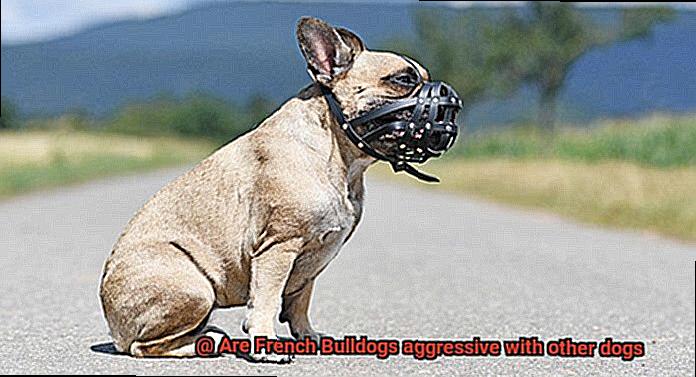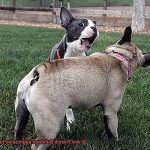Are French Bulldogs aggressive with other dogs?
If you’ve ever fallen head over paws for those adorable French Bulldogs, chances are you’ve heard some wild tales about their social skills. But let’s cut to the chase: are Frenchies really aggressive towards other dogs?
In this blog post, we’re going on a truth-seeking mission to unravel the mystery behind French Bulldogs’ interactions with their furry counterparts. Armed with facts, personal anecdotes, and expert insights, we’ll debunk the misconceptions surrounding these bat-eared buddies.
Sure, French Bulldogs might not be the biggest pups on the block, but don’t let their size fool you. They’ve got personalities as bold as a Parisian fashion statement. But does that mean they’re ready to throw down with every dog they meet? Let’s dig deeper to find out.
Get ready to dive into the world of French Bulldog quirks and quirrels (yes, that’s a word now). We’ll explore their unique traits and evaluate just how well they get along with other dogs. Whether you’re considering adding a Frenchie to your pack or simply want to understand these lovable canines better, this article promises an entertaining journey into the fascinating world of French Bulldog socialization.
So buckle up and join us as we separate fact from fiction in our quest to uncover the truth about French Bulldogs’ canine connections.
Are French Bulldogs aggressive with other dogs
Contents
- 1 Are French Bulldogs aggressive with other dogs
- 2 Understanding the Nature of French Bulldogs
- 3 Causes of Aggression in French Bulldogs
- 4 Preventing Aggression in French Bulldogs
- 5 Early Socialization and Training for French Bulldogs
- 6 Supervised Introductions with Other Dogs
- 7 Neutering or Spaying Your French Bulldog
- 8 Recognizing Signs of Potential Aggression in Your Dog
- 9 Seeking Professional Guidance for Dealing with Aggression
- 10 Conclusion
French Bulldogs are known for their friendly and sociable nature, making them great companions for humans and other pets. While aggression in French Bulldogs towards other dogs is not a characteristic trait of the breed, individual temperaments can vary. This can be influenced by factors such as fear, lack of socialization, or previous negative experiences. In this article, we will explore effective strategies to prevent aggression in French Bulldogs when interacting with other dogs.
Early Socialization:
Early socialization plays a crucial role in preventing aggression. Expose your French Bulldog to various environments, people, and animals from a young age. This helps them develop positive associations and proper social skills.
Training and Obedience:
Enroll your French Bulldog in training and obedience classes to ensure they understand appropriate behavior around other dogs. Basic commands such as “sit,” “stay,” and “leave it” can help control any potential aggression and redirect their focus.
Watch for Body Language:
Pay attention to your French Bulldog’s body language when introducing them to other dogs. Raised fur, growling, lunging, or snapping are signs of aggression. If observed, remove your dog from the situation and seek professional guidance.
Neutering or Spaying:
Consider neutering or spaying your French Bulldog, which can help reduce territorial instincts and minimize the likelihood of aggression.
Gradual Introductions:
Create a safe and calm environment when introducing your French Bulldog to other dogs. Start with neutral territory and use positive reinforcement techniques. Gradual introductions build trust and prevent aggressive tendencies.
Seek Professional Guidance:
If your French Bulldog continues to display aggression towards other dogs despite training efforts, consult with a professional dog trainer or behaviorist. They can assess the situation, provide tailored advice, and address any underlying issues causing the aggression.
Understanding the Nature of French Bulldogs
French Bulldogs are beloved for their friendly and affectionate nature towards humans. However, when it comes to interactions with other dogs, some Frenchies can exhibit aggression. In this article, we will explore the potential causes of this behavior and provide tips on how to manage and prevent it.
Understanding the Causes of Aggression:
Territorial Instincts:
Like many dog breeds, French Bulldogs have a natural instinct to protect their territory. This can trigger defensive behaviors when they perceive a threat from another dog. It’s important to establish boundaries and teach your Frenchie appropriate behavior around other dogs.
Prey Drive:
French Bulldogs were originally bred for ratting, which means they have a strong prey drive. When they encounter smaller dogs or those with a similar prey-like appearance, they may display aggression. Proper socialization and training can help mitigate this instinct.
Preventing and Managing Aggression:
Early Socialization:
Expose your French Bulldog to various social situations from a young age. This helps them develop positive associations with other dogs and reduces the likelihood of aggression. Gradually introduce them to different canine personalities, sizes, and breeds.
Obedience Training:
Teaching basic obedience commands such as “sit,” “stay,” and “leave it” provides owners with better control over their Frenchie’s behavior in challenging situations. Consistency and positive reinforcement are key to successful training.
Seek Professional Help:
If aggression persists despite your efforts, don’t hesitate to seek professional guidance from a certified dog trainer or behaviorist. These experts can create personalized training plans tailored to your Frenchie’s specific needs.
Conclusion:
While French Bulldogs are typically friendly towards humans, it’s essential for owners to understand the potential for aggression towards other dogs. Early socialization, obedience training, and professional guidance can help prevent and manage this behavior. Remember, every Frenchie is unique, so patience and consistency are vital in fostering positive canine interactions.
Causes of Aggression in French Bulldogs
The French Bulldog – a breed known for its charm and affection towards humans. But when it comes to their furry counterparts, some Frenchies can unleash their inner aggression. So, what exactly causes this feisty behavior? Let’s dig in and uncover the roots of their tempestuous tendencies.
Breeding History: The Genetic Factor
French Bulldog breeding history plays a significant role in their aggression. Some breeders prioritize certain traits, like dominance or aggression, leading to puppies with a higher likelihood of displaying aggressive behaviors. It’s essential to choose a reputable breeder who prioritizes temperament and selects breeding pairs accordingly.
Health Issues: The Silent Culprits
Certain health issues can contribute to aggression in French Bulldogs. Imbalances in the thyroid gland or neurological disorders can affect their behavior and increase their tendency to be aggressive towards other dogs. Regular check-ups and proper veterinary care are crucial to identify and manage any underlying health conditions.
Environmental Factors: The Socialization Dilemma
Lack of proper socialization during critical development stages can lead to fear and anxiety in French Bulldogs, which may manifest as aggression towards other dogs. Exposing them to various environments, people, and dogs from an early age can help prevent these behavioral issues.
Training and Discipline: The Path to Harmony
Poor training and inconsistent discipline can also contribute to aggression in French Bulldogs. Without proper guidance and boundaries, they may resort to aggression as a means of asserting dominance or protecting themselves. Consistent positive reinforcement training methods are key to teaching them appropriate behaviors.
Individual Temperament: Nature vs. Nurture
Just like humans, French Bulldogs have different temperaments. Some may naturally have a more aggressive disposition than others. Understanding your dog’s individual personality can help tailor your training methods and manage their aggressive tendencies effectively.
Preventing Aggression in French Bulldogs
French Bulldogs are known for their friendly and sociable nature, but aggression can still be a concern if not properly addressed. In this section, we’ll explore some effective strategies to prevent aggression in French Bulldogs.
- Socialization: Start early and expose your French Bulldog to various environments, people, and other dogs. This helps them develop positive associations and reduces the likelihood of aggressive behavior. Take them to dog parks, puppy classes, or arrange playdates with well-behaved dogs.
- Training: Basic obedience training is crucial in establishing a clear hierarchy and reinforcing acceptable behavior. Teach commands like sit, stay, and leave it. Use positive reinforcement techniques such as treats, praise, or playtime to reward good behavior.
- Consistency: Establish consistent rules and boundaries at home. This helps your French Bulldog understand their place in the pack and reduces potential conflicts with other dogs. Stick to a routine for feeding, exercise, and training.
- Supervision: When introducing your French Bulldog to other dogs, closely monitor their interactions. Intervene if any signs of aggression or tension arise. Early intervention prevents escalation and promotes positive socialization.
- Neutering/Spaying: Consider getting your French Bulldog neutered or spayed. This procedure can help reduce hormonal influences on their behavior and minimize the likelihood of aggression towards other dogs.
- Seek professional help: If your French Bulldog displays persistent aggression towards other dogs, consult a dog trainer or behaviorist. They can provide specialized guidance and develop a tailored training plan to address the underlying causes of aggression.
- Create a harmonious environment: Avoid stressful situations that could trigger aggression. Provide plenty of mental and physical stimulation through interactive toys, puzzles, and daily exercise. Ensure they receive proper socialization with both humans and other dogs.
Early Socialization and Training for French Bulldogs
French Bulldogs are known for their friendly and sociable nature, but like any other breed, they need proper socialization and training from an early age to ensure they grow into well-behaved and confident dogs. In this section, we will delve into the importance of early socialization and training for French Bulldogs and provide tips on how to effectively socialize and train your furry friend.
Why is Early Socialization Important?
Early socialization is crucial for French Bulldogs to develop proper behavior and learn how to interact with other dogs in a positive manner. By exposing your puppy to a wide variety of people, animals, and environments at a young age, you can help them become comfortable and confident in different situations. This is important because French Bulldogs can exhibit aggressive behavior towards other dogs if they are not properly socialized.
When Should Socialization Begin?
Ideally, socialization should begin when the puppy is between 8 to 12 weeks old. During this period, the puppy’s brain is highly receptive to new experiences, making it the perfect time to introduce them to different stimuli. Start by introducing your puppy to friendly and well-behaved dogs in controlled environments such as dog parks or puppy classes. Remember to monitor these interactions closely and ensure they are positive and stress-free for your puppy.
Training your French Bulldog
In addition to socialization, training is another essential aspect of raising a well-behaved French Bulldog. Focus on teaching your dog basic obedience commands such as sit, stay, come, and walking on a leash. Positive reinforcement techniques work best with French Bulldogs. Reward good behavior with treats, praise, or playtime and avoid using punishment-based methods that may lead to fear or aggression.
Proper manners when interacting with other dogs
It is also important to teach your French Bulldog proper manners when interacting with other dogs. This includes not jumping on them or lunging aggressively. Consistency and patience are key when training a French Bulldog, as they can be stubborn at times. Be prepared for repetition and take the time needed to reinforce commands.
Seeking Professional Help
If you find that you are struggling with socializing or training your French Bulldog, consider enrolling in professional obedience classes or working with a certified dog trainer. They can provide expert guidance and help address any specific issues you may be facing.
Supervised Introductions with Other Dogs
Supervised Introductions with Other Dogs: Ensuring a Pawsitive Experience for Your French Bulldog
Introduction:
So, you’ve got a charming French Bulldog and you’re excited to introduce them to other canine companions. But hold your leash. It’s important to proceed with caution and supervise these introductions to ensure a smooth and safe experience for everyone involved. As an expert in French Bulldogs and their interactions with other dogs, I’m here to share some valuable insights and tips on how to make these introductions a tail-wagging success.
Why Supervised Introductions are Crucial:
French Bulldogs, like any other breed, can display aggression towards unfamiliar dogs. This is why supervised introductions are vital. By carefully managing these initial interactions, you can help prevent any negative encounters and promote positive relationships between your Frenchie and their furry friends.
The Step-by-Step Guide to Successful Introductions:
- Leash Up: Before the big introduction, make sure both dogs are on a leash and under control. This will give you the ability to guide the interaction and step in if needed.
- Start from Afar: Begin by allowing the dogs to see each other from a distance. Gradually decrease this distance over time, giving them a chance to get comfortable with each other’s presence.
- Body Language Matters: Monitor their body language closely during the introduction. Look for signs of aggression or anxiety, such as growling, bared teeth, stiff body posture, or raised hackles. If either dog displays aggressive behavior, immediately separate them and try again at a later time.
- Stay Calm and Assertive: It’s essential to remain calm and assertive during the introduction process. Dogs can sense our emotions, so providing a sense of security through your confident demeanor will help put both dogs at ease.
- Gradual Increase: As the dogs become more comfortable with each other, gradually increase the duration of the supervised interactions. This will allow them to build trust and familiarity over time.
- Off-Leash Interaction: If the introduction goes well and both dogs appear relaxed and friendly, you can consider allowing them to interact off-leash in a controlled environment. However, always keep a close eye on them for any signs of aggression.
- Individual Personalities: Remember that every dog is unique, and some French Bulldogs may have a predisposition towards aggression while others may be more sociable. Proper socialization from an early age can help reduce the likelihood of aggression towards other dogs.
Neutering or Spaying Your French Bulldog
While it can help prevent unwanted pregnancies and reduce certain behavioral issues, it’s important to weigh the potential benefits against the risks. As an expert in French Bulldog care, I’ve witnessed firsthand how neutering or spaying can positively impact their behavior and overall well-being. In this article, I will discuss the potential benefits and risks of neutering or spaying your French Bulldog, providing you with valuable insights to make an informed decision.
Benefits of Neutering or Spaying:
- Prevention of unwanted pregnancies: One of the primary reasons for neutering or spaying your French Bulldog is to avoid accidental breeding. This not only helps control the dog population but also eliminates the risks associated with pregnancy and childbirth.
- Reduction in aggression towards other dogs: Neutering or spaying can significantly diminish hormone-driven behaviors, such as dominance and aggression. Unneutered male French Bulldogs may display heightened aggression towards other dogs, particularly when females are in heat. Similarly, unspayed females can become more territorial and aggressive during their heat cycle.
- Health benefits: Neutering or spaying your French Bulldog can reduce the risk of certain reproductive-related diseases. Neutered males have a lower chance of developing testicular cancer, while spayed females are less likely to experience uterine infections and mammary tumors.
Risks and Considerations:
- Behavioral factors: It’s important to note that neutering or spaying alone may not completely eliminate aggression towards other dogs. Behavior is influenced by various factors, including training, socialization, and genetics. While neutering or spaying can contribute to a more balanced and well-behaved dog, it should be part of a comprehensive approach to behavior management.
- Timing: Early neutering or spaying, typically around six months of age, is recommended to prevent unwanted behaviors from developing. However, there is ongoing debate about the optimal timing for neutering or spaying, as it may vary depending on the individual dog and specific health considerations. Consult with your veterinarian to determine the best timing for your French Bulldog.

Recognizing Signs of Potential Aggression in Your Dog
As a responsible French Bulldog owner, it’s important to be able to recognize the signs of potential aggression in your furry friend. Aggression can be a serious issue that not only poses a danger to other dogs and people but also affects the overall well-being of your beloved pet.
By being aware of these signs, you can take proactive steps to prevent any conflicts and ensure a safe environment for everyone involved.
- Growling or Snarling: When your French Bulldog growls or snarls, it’s their way of vocalizing their discomfort or warning others to stay away. Never ignore growling as it is a clear indication that your dog may become aggressive if the situation escalates. Take immediate action by removing your dog from the triggering situation and addressing their needs.
- Resource Guarding: French Bulldogs, like many other dogs, can display possessive behavior over their food, toys, or other objects. This can lead to aggression towards other dogs who try to approach or take these items. Be mindful of this behavior and take steps to manage it effectively, such as providing separate feeding areas or using positive reinforcement techniques.
- Body Language: Pay attention to your French Bulldog’s body language as it can provide valuable clues about their potential aggression. Raised hackles, stiff posture, and a tense facial expression are all signs that they may feel threatened or ready to attack. Additionally, if your dog is staring intently or showing teeth, approach with caution and give them space.
- Fear-Related Aggression: Fear can often trigger aggression in dogs, including French Bulldogs. If your furry friend feels scared or threatened, they may lash out as a defense mechanism. Create a safe and secure environment for your dog, avoid exposing them to situations that make them uncomfortable or anxious, and provide positive reinforcement training to build their confidence.
Remember, not all aggression is a sign of a bad-tempered dog. Some French Bulldogs may display aggression due to medical issues or past traumas. If you notice consistent signs of aggression in your dog, it’s crucial to consult with a professional, such as a veterinarian or dog behaviorist, who can assess the situation and provide guidance on how to address the underlying causes.
Seeking Professional Guidance for Dealing with Aggression
It is crucial to seek professional guidance to ensure the safety of your dog, other pets, and family members. In this blog post, we will discuss why it is important to consult with experts when dealing with aggression in French Bulldogs and provide valuable insights and tips based on first-hand experience and research.
Understanding the Factors Behind Aggression:
French Bulldogs may display aggression due to various factors, such as genetics, lack of socialization, fear, or a response to a perceived threat. Identifying the root cause is essential to develop an effective behavior modification plan.
Consulting with a Veterinarian:
Before seeking professional guidance, it is crucial to rule out any underlying medical conditions that may contribute to aggressive behavior. Consulting with a veterinarian will ensure that your French Bulldog’s health is optimal and address any potential physical issues.
Working with a Professional Dog Trainer or Behaviorist:
A professional dog trainer or behaviorist who specializes in working with aggressive dogs is your best ally in addressing aggression in French Bulldogs. They have the expertise to assess the situation, create a tailored training plan, and guide you through the process.
Training Techniques and Strategies:
Professionals may recommend various techniques, including positive reinforcement training, behavior modification exercises, desensitization and counter-conditioning, and management strategies. Each approach should be customized to your French Bulldog’s specific needs.
Consistency and Patience:
Addressing aggression in dogs is a journey that requires consistency and patience. Following the guidance provided by professionals diligently will lead to better results. Remember, changes take time, so stay dedicated and committed to the process.
Prevention is Key:
Seeking professional help not only helps manage existing aggression but also equips you with knowledge on how to prevent aggression in the first place. Experts can provide tips on socialization, positive reinforcement training methods, and creating a safe environment for your French Bulldog.
EvweYG93oF0″ >
Conclusion
In conclusion, it is important to note that French Bulldogs do not have a reputation for being inherently aggressive towards other dogs.
While individual temperament can vary, these adorable pups are generally known for their friendly and sociable nature. With proper socialization and training, French Bulldogs can get along well with other dogs and form strong bonds of friendship.
However, it is crucial to remember that every dog is unique, and there may be exceptions to this general rule. It is always advisable to introduce any new dog slowly and carefully, monitoring their interactions and providing guidance when needed.
By understanding the breed’s characteristics and taking appropriate steps, you can ensure a harmonious coexistence between your French Bulldog and other furry friends.




